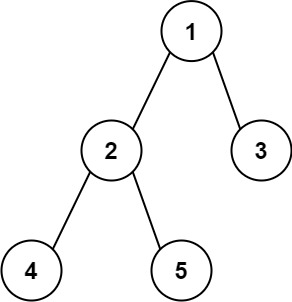543. Diameter of Binary Tree
EasyLeetCodeGiven the root of a binary tree, return the length of the diameter of the tree.
The diameter of a binary tree is the length of the longest path between any two nodes in a tree. This path may or may not pass through the root.
The length of a path between two nodes is represented by the number of edges between them.
Example 1 
Input: root =
[1,2,3,4,5]Output:
3Explanation: 3 is the length of the path [4,2,1,3] or [5,2,1,3].
Example 2
Input: root =
[1,2]Output:
1
Constraints
- The number of nodes in the tree is in the range
[1, 10^4]. -100 <= Node.val <= 100
How to solve the problem
- Depth-First Search (DFS)
python
# Definition for a binary tree node.
# class TreeNode:
# def __init__(self, val=0, left=None, right=None):
# self.val = val
# self.left = left
# self.right = right
# The diameter of a binary tree is the length of the longest path between any two nodes.
# This path may or may not pass through the root.
# For each node, the longest path that passes through it equals the sum of the depths of its left and right subtrees.
# We use DFS to compute the depth of each subtree and update the maximum diameter found.
class Solution:
def diameterOfBinaryTree(self, root: Optional[TreeNode]) -> int:
result = -inf
def dfs(node):
if node is None:
return -1
l_len = dfs(node.left) + 1 # Length of left subtree
r_len = dfs(node.right) + 1 # Length of right subtree
nonlocal result
result = max(result, l_len + r_len)
return max(l_len, r_len)
dfs(root)
return result # Return the maximum diameterComplexity
- Time complexity: O(n)
- Space complexity: O(h)
Comments
No comments yet. Be the first to comment!